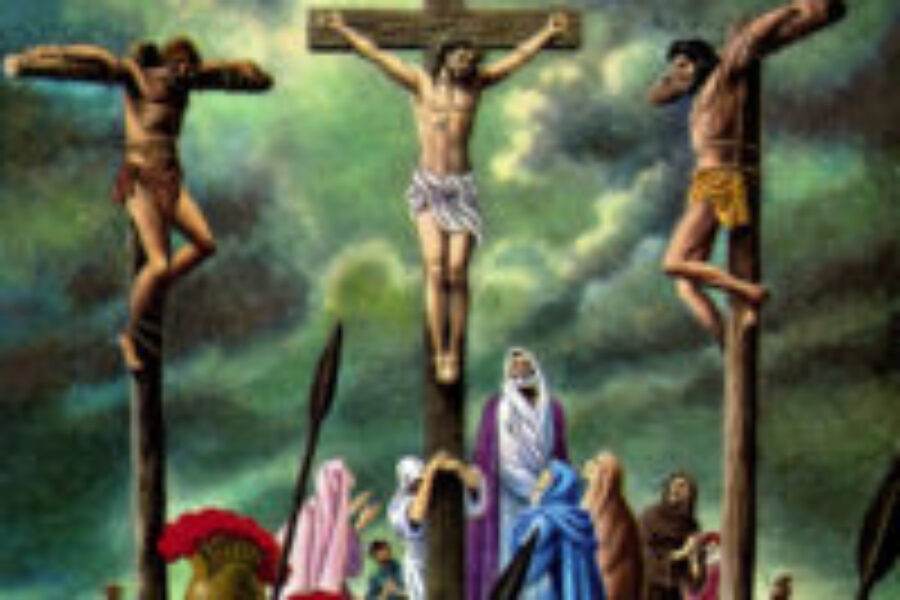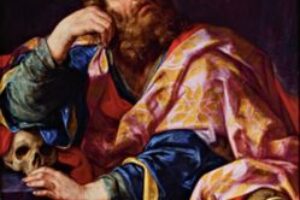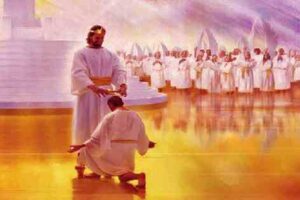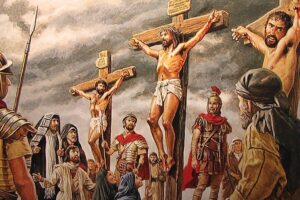LEARNING TO DEPEND ON GOD
The biblical Word of God says: “In him [Lord God] we live and move and have our being” (Acts 17:28). And “apart from [him] you can do nothing” John 15:5). However, we “can do all things through Christ who gives [us] strength” (Philippians 4:13).

MOSES FELT INADEQUATE, BUT LEARNED TO DEPEND ON GOD.
God told Moses: “I have seen how my people are suffering as slaves in Egypt, and I have heard them beg for my help because of the way they are being mistreated. I feel sorry for them, 8 and I have come down to rescue them from the Egyptians.
I will bring my people out of Egypt into a country where there is a lot of good land, rich with milk and honey. I will give them the land where the Canaanites, Hittites, Amorites, Perizzites, Hivites, and Jebusites now live. 9 My people have begged for my help, and I have seen how cruel the Egyptians are to them. 10 Now go to the king! I am sending you to lead my people out of his country.
11 But Moses said, “Who am I to go to the king and lead your people out of Egypt?” (Exodus 3:7-11).
The Lord Gives Great Power to Moses
4 Moses asked the Lord, “Suppose everyone refuses to listen to my message, and no one believes that you really appeared to me?”
2 The Lord answered, “What’s that in your hand?”
“A walking stick,” Moses replied.
3 “Throw it down!” the Lord commanded. So Moses threw the stick on the ground. It immediately turned into a snake, and Moses jumped back.
4 “Pick it up by the tail!” the Lord told him. And when Moses did this, the snake turned back into a walking stick.
5 “Do this,” the Lord said, “and the Israelites will believe that you have seen me, the God who was worshiped by their ancestors Abraham, Isaac, and Jacob.”
6 Next, the Lord commanded Moses, “Put your hand inside your shirt.” Moses obeyed, and when he took it out, his hand had turned white as snow—like someone with leprosy.[a]
7 “Put your hand back inside your shirt,” the Lord told him. Moses did so, and when he took it out again, it was as healthy as the rest of his body.
8-9 Then the Lord said, “If no one believes either of these miracles, take some water from the Nile River and pour it on the ground. The water will immediately turn into blood.”
10 Moses replied, “I have never been a good speaker. I wasn’t one before you spoke to me, and I’m not one now. I am slow at speaking, and I can never think of what to say.”
11 But the Lord answered, “Who makes people able to speak or makes them deaf or unable to speak? Who gives them sight or makes them blind? Don’t you know that I am the one who does these things? 12 Now go! When you speak, I will be with you and give you the words to say.”
13 Moses begged, “Lord, please send someone else to do it.”
14 The Lord became angry with Moses and said:
What about your brother Aaron, the Levite? I know he is a good speaker. He is already on his way here to visit you, and he will be happy to see you again. 15-16 Aaron will speak to the people for you, and you will be like me, telling Aaron what to say. I will be with both of you as you speak, and I will tell each of you what to do. 17 Now take this walking stick and use it to perform miracles.
After the Lord used Moses to perform convincing miracle before the king of Egypt, he freed the people of Israel. However, the king decided to pursue the people of Israel. But when the people came to the Red Sea, God instructed Moses, “lift up your rod, and stretch out your hand over the sea and divide it.” With the Sea being divided the people went through the other side. When the Egyptians pursued Israel, God told Moses, Then the Lord said to Moses, “Stretch out your hand over the sea, that the waters may come back upon the Egyptians, on their chariots, and on their horsemen…
“So the Lord (AK)saved[g] Israel that day out of the hand of the Egyptians, and Israel (AL)saw the Egyptians dead on the seashore. 31 Thus Israel saw the great [h]work which the Lord had done in Egypt; so the people feared the Lord, and (AM)believed the Lord and His servant Moses” “Exodus 14)

THE LORD TAUGHT PAUL TO RELY ON GOD.
Paul was self-confident in his own abilities to do God’s work, even though he did not know the Lord Jesus Christ. This was before Jesus appeared to him on a road to Damascus and knocked him off his “high horse.”
Before he met Jesus, Paul could boast to Jewish leaders: “I am a Jew, born in Tarsus in Cilicia, but brought up in this city, educated (D)at the feet of (E)Gamaliel[b] (F)according to the strict manner of the law of our fathers, (G)being zealous for God (H)as all of you are this day. 4 (I)I persecuted (J)this Way (K)to the death, binding and delivering to prison both men and women, 5 as (L)the high priest and (M)the whole council of elders can bear me witness. From them I received letters to (N)the brothers, and I journeyed toward Damascus to take those also who were there and bring them in bonds to Jerusalem to be punished.
But after he met Jesus, Paul said: “As I was on my way and drew near to Damascus, about noon a great light from heaven suddenly shone around me. 7 And I fell to the ground and heard a voice saying to me, ‘Saul, Saul, why are you persecuting me?’ 8 And I answered, ‘Who are you, Lord?’ And he said to me, ‘I am (P)Jesus of Nazareth, whom you are persecuting.’ 9 (Q)Now those who were with me saw the light but did not understand[c] the voice of the one who was speaking to me. 10 And I said, (R)‘What shall I do, Lord?’ And the Lord said to me, ‘Rise, and go into Damascus, and there you will be told all that is appointed for you to do.’ 11 And since I could not see because of the brightness of that light, I was led by the hand by those who were with me, and came into Damascus” (Acts 22:3-11ESV).
In Damascus, Paul was filled with the Holy Spirit. Then the Spirit enabled Paul to do God’s work. Being anointed by the Spirit preached to Jews and Gentiles, who believed in in Jesus Christ as their Savior and Lord (Acts 9:!0-31). And the Spirit enabled the apostle to be an example of suffering for Christ to the Church (Acts 9:15-16; Corinthians 11:23-31)
The apostle Paul was persuaded by the Lord: “I can do all things (A)through [a]Christ who strengthens me” (Philippians 4:13).
Paul was overly self-confident in his ability to do God’s work, by his education, speech and abilities.
But he learned that he could do nothing for God without Christ. Yet, Paul learned, without Christ. knowledge and eloquence tend to poof one up. But when one is dependent on God, they could be used by God to save souls, rather than persecute or mislead God’s people. Acts 9:1- : Ezekiel 18:4). And even after he was chosen by the Lord to be an apostle, he recognized that he needed the prayers of the people the Church to be effective in the work of the Lord. ( ). He repeatedly asked for their prayers that he might effective in the work of the Lord ( ).
JESUS DEPENDED ON GOD THE FATHER.
Jesus was in the form of God, being equal with God; but he humbled himself and took the form of mankind. In the form of mankind he was submissive to the Father will in dying on a cross for the salvation of the world (Philippians 2:5-8; John 3:16).
In the flesh, Jesus said: “Very truly I tell you, the Son can do nothing by himself” (John 5:19). “Rather, it is the Father, living in me, who is doing his work” (John 14:10).
When Jesus was in the flesh and was faced with dying an agonizing death on a cross to atone for the sins of the world, he depended on his Father for ability to do God’s will. Jesus prayed: “Father, if it is Your will, take this cup away from Me; nevertheless not My will, but Yours, be done” (Luke 22:42). And when our Lord Jesus Christ was dying on the cross, he called out with a loud voice, “Father, into your hands I commit my spirit” (Luke 23:46).
WE SHOULD DEPEND ON GOD.
We should depend on the Lord God Like Moses learned to do. We ought to rely on him like Lord like Paul also learned to do. But most of all, we should follow our Lord’ example of dependence on God in all things. For “Even though Jesus was God’s Son, he learned obedience from the things he suffered” (Hebrews 5:8).
However, if we suffer for depending on the Lord, by the power of the indwelling Holy Spirit; God assures us, “we shall also reign with him” (John 14:15-17; 2 Timothy 2:12).







